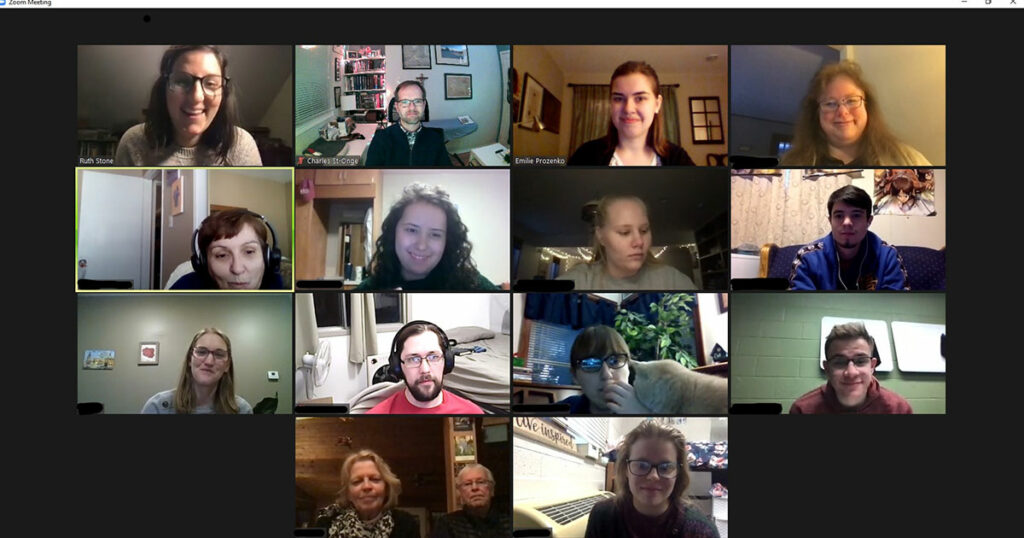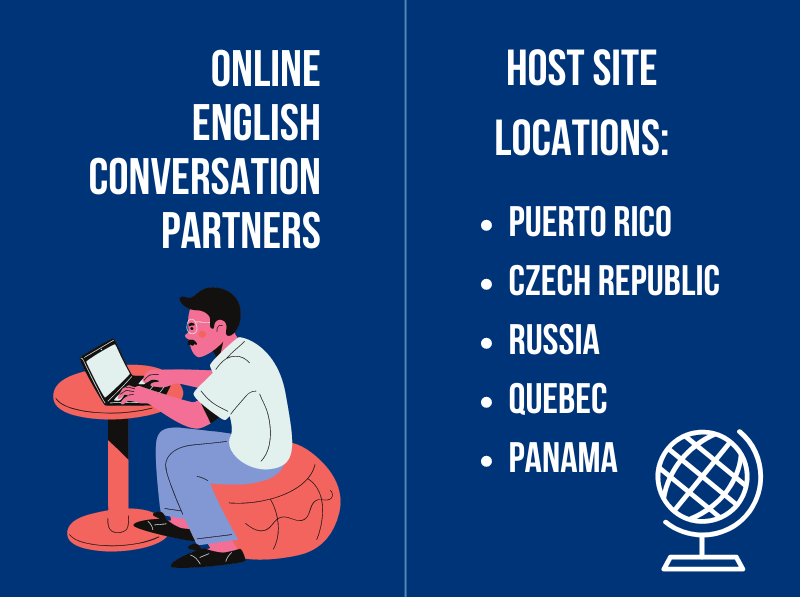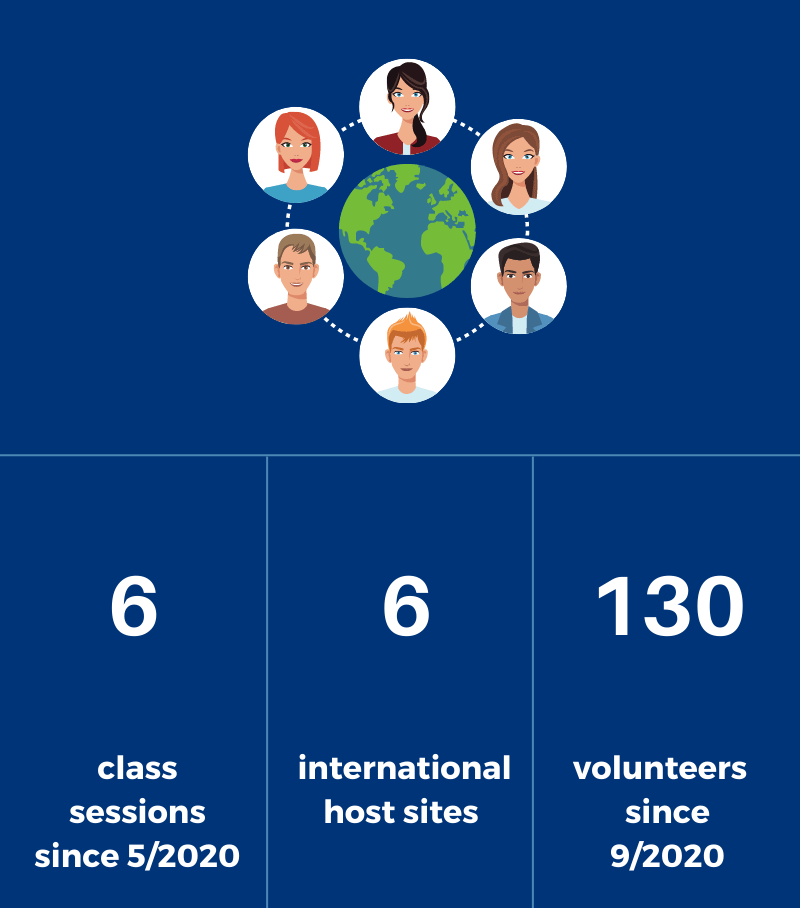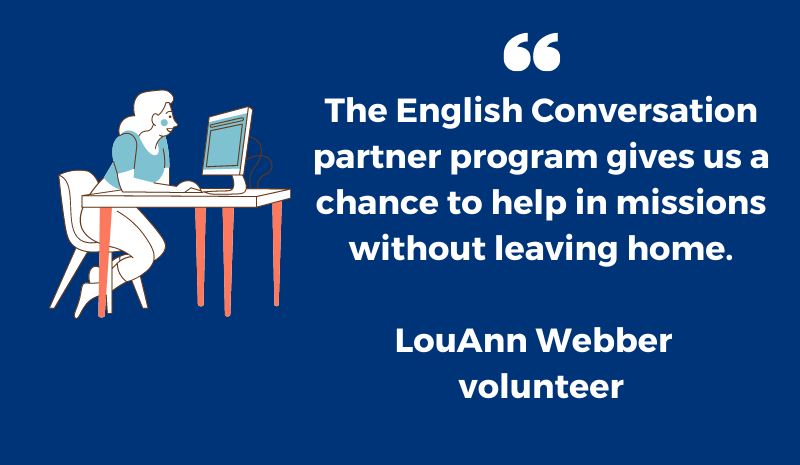
In the winter of 2021, a group of volunteers from across the U.S. and from Quebec assembled for orientation in LCMS International Mission’s English Conversation Partners program. Across the top row from left: Ruth Stone (Montreal lay volunteer), the Rev. Charles St-Onge, Emilie Prozenko, and Dr. Vicki Anderson of Concordia University, Nebraska, who leads the ESL program there. (Photo courtesy of the Rev. Charles St-Onge)
By Stephenie Hovland
Hardships often produce creative ideas.
Limitations force us to look outside our typical routines and programs to accomplish God’s work. Because travel was so limited in early 2020 and the future of travel was unknown, the LCMS International Mission team looked for new ways to support short-term international mission work.
The pilot program for English Conversation Partners launched in May 2020. Eighty-two volunteers responded to the first request for help with this innovative program that matches stateside volunteers with English language learners in different parts of the globe.
It was so successful that mission teams continue to host these programs, and people to volunteer, even now that travel restrictions have lightened. The one-on-one conversations serve students who want to practice their English skills and help missionaries have meaningful contact with more people.

Why do volunteers from the U.S. continue to be involved?
American volunteers find themselves joining the program for all sorts of reasons. Some need relief from all the pandemic news and restrictions, so they connect with people from other countries in a way that takes them outside their own situations for an hour a week.
Others have always thought being a missionary was a noble vocation, but are either reluctant or unable to serve as a missionary at this time. So these teens, young adults, working adults, retired folks, pastors, teachers and people from lots of different backgrounds keep signing up to join this new adventure.
“Sharing personal experiences [and] stories of our backgrounds and how God has shaped our lives was encouraging to both my conversation partner and to myself. This hour of my day was enriched by sharing God’s Word and His faithfulness,” said Katherine Dubke.
What do these volunteers encounter when they sign up?
American volunteers go through a vetting process with background checks. They receive guidance to make sure they have some idea of what it might be like to engage with people from different cultures and countries. After agreeing to a code of ethics and reading about best practices, they show up for their first Zoom meeting.
During the live video orientation, the hosting mission team spends time with the volunteers in a group, orienting them to the timeline and content. They also spend time going through the technology side of things and discussing how to prepare for their first official session. After more encouraging words and prayer, the volunteers are dismissed and ready for the first session.

Confident conversations start to happen.
As the weeks go by, English Conversation Partners notice how what might have started out as awkwardness changes to a more natural ebb and flow of conversation. Some volunteers have even felt comfortable from the very beginning. No matter where they start, the feeling of mutual encouragement is common.
The international conversation partner smiles when he realizes they’ve just held a full conversation in English. The American conversation partner smiles because she knows she has helped boost the confidence of her partner’s language skills.
“It will feel awkward sometimes — especially toward the beginning — but if they are open and honest and willing to sometimes laugh at themselves, wonderful conversations and relationships can often be the end result. I would also tell them to pray: for the group, for their partner, and for themselves,” said Meghan Nelson.
“We relaxed and went where the conversation took us. We left the rest to God,” said Hayden and Amy Brown.
How is this a mission?
Some of the English language learners are already Christians. They may be Lutheran, but many times are not.
“Maria and I have been matched for three sessions, and our conversations are more and more meaningful. She is joining activities at the church and excited to share with me,” said Sarah Erickson.
Some of the people who are attracted to these classes are not coming because it is connected to a mission or a church. They simply want to practice their English conversation skills.
“I think just being interested in their lives and sharing my life and my faith indicated that Christians are caring and willing to be involved,” said LouAnn Gotch.

Join the mission team.
Missionaries will tell you that their service is not just a blessing to those they serve. It also blesses them. As an English Conversation Partner volunteer, you will notice blessings, too. Knowing you’re part of a mission team is rewarding.
“I had the privilege of encouraging a sister in Christ. She has more ability to speak English than she realizes. Growing confidence in English will help. Listening to her and reminding her of her worth in Christ was the best gift I could give,” said Lisa Stapp.
To learn more about the opportunity to volunteer as an English Conversation Partner, visit servenow.lcms.org or follow LCMS International Mission on Facebook or Instagram.
Stephenie Hovland serves the LCMS International Mission team as a deaconess intern. She is a former Lutheran school teacher who lives in Portage, Wis., with her husband, the Rev. Greg Hovland.